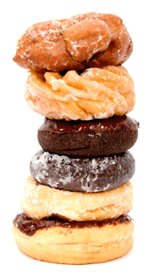Emotional Eating In Midlife -
Eating Because Of Feelings, Not Hunger
ADVERTISEMENT
Emotional eating, when feelings trigger your desire for unhealthy foods, can add to menopausal weight gain problems, because your body is already pre-disposed to gain weight easily at this time of life.
Taking on board extra calories from high fat, sweet or salty foods simply makes things worse. Comfort eating can be a real obstacle, when you want to shed some pounds.
If you're a comfort eater, then you tend to turn to food to make you feel better when you're sad, bored, angry, tired or feeling lonely or helpless, rather than trying healthier ways to relieve stress.
And it's no surprise that veggies and healthy foods aren't the ones you crave. You're much more likely to head for the cakes and cookies, chocolate and candy or ice cream when you're feeling in need of a cheer-up.
Are you an emotional eater?

These are the clues to emotional eating:
- You eat because your feelings overwhelm you, and food is a source of comfort. You turn to stress eating whenever the going gets tough.
- You don't rely on hunger to tell you when to eat - and you may not recognise the feeling of hunger when you experience it.
- You sometimes find yourself eating without realising that you've reached for food.
- The way you eat makes you feel guilty and ashamed - it's something you want to hide from other people.
- The worse you feel about your eating, the more likely you are to do it - it's a cycle you can't break.
- Particular foods act like a trigger, so when you have an argument, for instance, your automatic response is to go to the freezer for ice cream.
- You're easily seduced into eating unhealthy foods, even when you're not at all hungry. The smell of freshly baked pastries, or the sight of a tray of doughnuts makes you long to eat.
What causes emotional eating?
There could be feelings from your past or present life that you haven't addressed, maybe because it's too difficult or painful. But feelings don't go away so easily, and when you start to feel disturbed or unhappy, food is an easy way of making yourself feel better.
Boredom, coupled with the abundance of food that's all around us, can also have an effect. Nothing to do? Grab some potato chips, or have a burger to occupy yourself - simple, but oh-so-bad for your waistline. It's known as mindless eating, and it's a surefire way to pile on the pounds without even thinking about it.
It's also been suggested that some foods have an addictive quality, so that you can get hooked on them, and need to wean yourself off your daily fix in order to break the overeating pattern.
Emotional eating is a problem that affects a lot of women, and in the menopausal years, as you work your way through what can be a difficult transition, it's easy to use food as a prop in the fight against stress.
But there are solutions. Here's how to stop emotional eating, and build a freer, healthier relationship with food.
Go to Beat Menopause Weight Gain Home Page. Or go back to the top of Emotional Eating In Midlife.





